|
|
|
Anita Lily Pollitzer was from Charleston, South Carolina, where her father worked as a cotton exporter and civic reformer. Her mother, Clara Guinzburg Pollitzer, was the daughter of an immigrant rabbi from Prague. Pollitzer graduated from Hunter College and taught German before marrying freelance press agent Elie Charlier Edson in 1928. Edson encouraged Pollitzer in her career and her studies. Pollitzer also trained as an artist in New York City and studied with Alfred Stieglitz. She graduated from the School of Practical Arts at the Teachers College at Columbia University in 1916, where she was a good friend of Georgia O'Keeffe. Pollitzer also earned a master's degree in international law from Columbia University in 1933. Pollitzer turned to the suffrage cause while at home on a vacation break from school. Her two sisters, Mabel and Carrie Pollitzer, as well as two aunts, were active in the local suffrage movement. Her family was supportive of her move to Washington after her graduation from college to work for the NWP. Pollitzer became a stalwart of both the suffrage and equal rights movements. She traveled extensively across the country to speak, organize, and participate in picketing. As a young activist, Pollitzer was praised by her co-workers and NWP head Alice Paul for her ever-sunny disposition and effectiveness in fund-raising and speaking. As she became older, her leadership was publicly and privately challenged. Pollitzer had a personal hand in the lobbying effort that helped secure the ratification of the 19th Amendment. In August 1920, the night before a special session of the Tennessee legislature voted on the amendment, she dined with legislator Harry T. Burn. The next day, Burn cast the critical vote making Tennessee the 36th and decisive state to ratify the amendment. Pollitzer's career in the NWP extended well after suffrage was won. She began a long-time stint as a member of the NWP executive committee in 1921 and served as national secretary (1921-26), national congressional secretary, Congressional Committee vice-chairman, national vice-chairman (1927-38), and national chairman (1945-49). When Alice Paul proposed the introduction of the Equal Rights Amendment in Seneca Falls in 1923, Pollitzer seconded the proposal. She wrote for Equal Rights and testified repeatedly before congressional committees, working nationwide to bring the ERA successfully to the Senate calendar for the first time in 1938. That same year, Pollitzer was influential in the passage of the National Fair Labor Standards Act and joined with Paul to form the World Woman's Party (WWP), which worked for recognition of women's equality in the United Nations charter. Pollitzer was a delegate to the San Francisco conference of the United Nations in 1945, the same year that she succeeded Paul as NWP chairman. She became vice chairman of the WWP, and she and Paul were also active together in the International Woman Suffrage Alliance. Pollitzer was honorary national chairman of the NWP from 1949 until her death. She died in Queens, New York, at the home of a caretaker. |
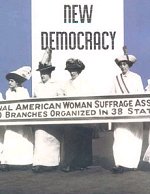 Woman Suffrage and the New Democracy The woman suffrage movement achieved its goal by forging a highly organized and centrally controlled interest group, the National American Woman Suffrage Association (NAWSA), one of the most effective single-issue pressure groups in the United States |
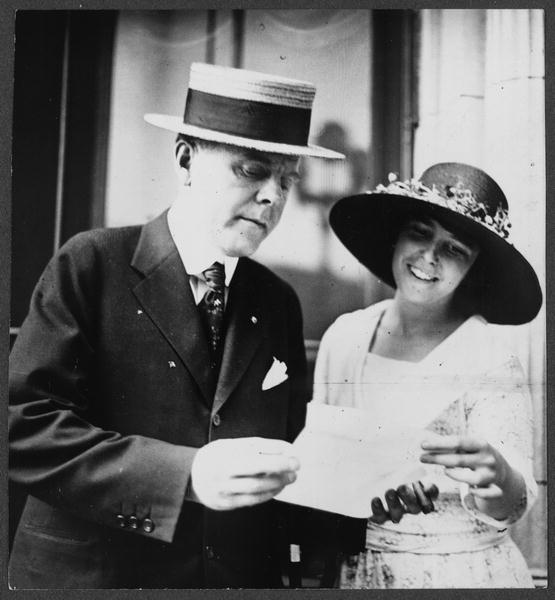
| Officers of the National Woman's Party meeting in Washington to complete the plans for the dedication ceremonies on May 21st of the Party's new national headquarters opposite the Capitol. Alice Paul, New Jersey, vice president, Miss Sue White, Tennessee Chairman, Mrs. Florence Boeckel, executive committee, Miss Mary Winsor, member of the Council, Miss Anita Pollitzer, South Carolina, legislative secretary, Sophie Meredith, Virginia chairman, and Mrs. Richard [Wainwright], District of Columbia, member of the Council. click to enlarge picture 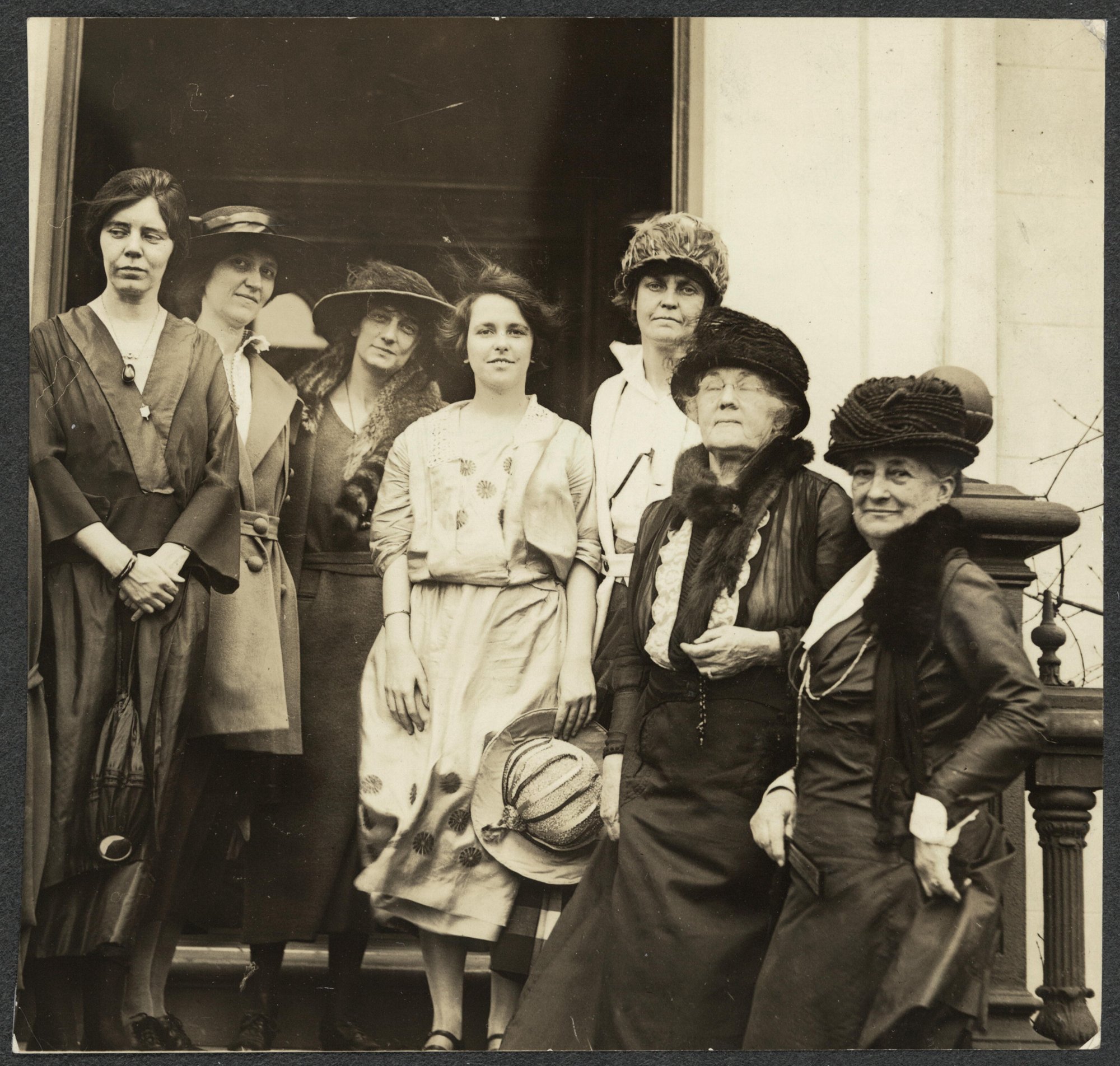 Photograph of (left to right) Alice Paul (far left), Sue White, Florence Boeckel, Anita Pollitzer (center, holding hat), Mary Winsor, Sophie Meredith, and Mrs. Richard Wainwright (far right) of the National Woman's Party |
Women of the American Suffrage Movement
Womens Suffrage Timeline
American Civil War Women
Womens Civil War Reading Titles
American Civil War Recipes
Civil War Exhibits
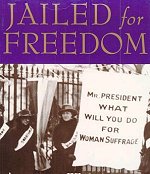 Jailed for Freedom by: Doris Stevens Dramatic documentation of women's struggle to win the vote is brought to light by a firsthand witness who reveals, among other facts, the imprisonment, vilification and brutality women experienced during their fight |
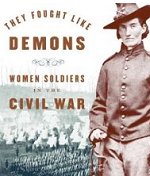 They Fought Like Demons Women Soldiers in the Civil War More than sixty women who fought or who served the Union or Confederacy in other important ways are featured in this work. Among those included are Sarah Thompson, the Union spy and nurse who brought down the famous raider John Hunt Morgan |
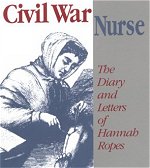 Civil War Nurse: The Diary and Letters of Hannah Ropes Hannah Ropes kept a diary for only one year during the time she served as a nurse in the Civil War. She actually supervised Louisa Mae Alcott and was responsible for many of the reforms in the hospital where she worked. She was a well-spoken woman who was also not afraid to stand up to her male supervisors |
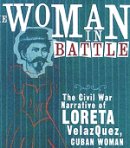 The Woman in Battle: The Civil War Narrative of Loreta Janeta Velazquez, Cuban Woman and Confederate Soldier A Cuban woman fought in the Civil War for the Confederacy as the cross-dressing Harry T. Buford. As Buford, she organized an Arkansas regiment; participated in the historic battles of Bull Run, Balls Bluff, Fort Donelson, and Shiloh |
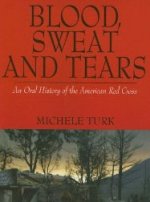 Blood, Sweat And Tears An Oral History of the American Red Cross The story of the modern-day Red Cross through the voices of twenty-nine current and former Red Cross paid and volunteer staff from all parts of the country. Stories range from that of a World War II veteran who credits the Red Cross packages with keeping him alive |
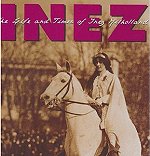 The Life and Times of Inez Milholland Inez Milholland was the most glamorous suffragist of the 1910s and a fearless crusader for women's rights. Moving in radical circles, she agitated for social change in the prewar years, and she epitomized the independent New Woman of the time. Her death at age 30 while stumping for suffrage in California in 1916 made her the sole martyr of the American suffrage movement. |
Kindle Available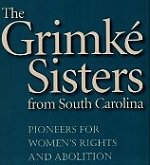 The Grimke Sisters from South Carolina: Pioneers for Women's Rights and Abolition A landmark work of women's history originally published in 1967, Gerda Lerner's best-selling biography of Sarah and Angelina Grimke explores the lives and ideas of the only southern women to become antislavery agents in the North and pioneers for women's rights. This revised and expanded edition includes two new primary documents and an additional essay by Lerner. In a revised introduction Lerner reinterprets her own work nearly forty years later and gives new recognition to the major significance of Sarah Grimke's feminist writings |
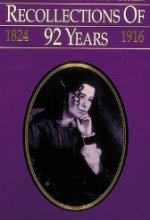 Recollections of 92 Years, 1824-1916 When the indomitable Meriwether was banned from her home by Union soldiers because her husband was a Confederate officer, she spent the next two years bartering for food and shelter for herself and her three young sons. After the war, Meriwether embarked on a decades-long career as an author and advocate for the equality of women, keeping up the crusade until her death in 1916--the year congressional support for women's suffrage emerged. |
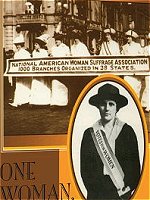 One Woman One Vote This program documents the struggle which culminated in the passing of the 19th Amendment in the U.S. Senate by one vote. Witness the 70-year struggle for women's suffrage. Discover why the crusaders faced entrenched opposition from men and women who feared the women's vote would ignite a social revolution. DVD |
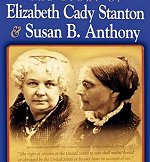 Not for Ourselves Alone: The Story of Elizabeth Cady Stanton & Susan B. Anthony Together they fought for women everywhere, and their strong willpower and sheer determination still ripples through contemporary society. Here lies the story of two of our century's most celebrated pioneers Elizabeth Cady Stanton and Susan B. Anthony. DVD |
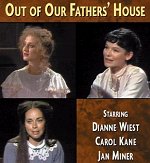 Out of Our Fathers House Broadway Theatre Archive This play presents the true stories of women who sought independence at any cost. The compelling text is taken entirely from the diaries, journals and letters of the characters portrayed. |
Sources:
U.S. Library of Congress
Federal Citizen